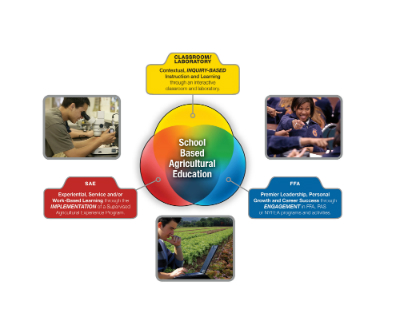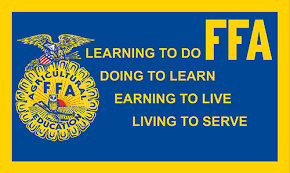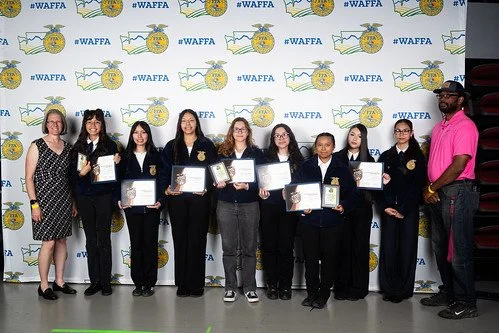What is FFA?
FFA is a dynamic youth organization that changes lives and prepares members for premier leadership, personal growth and career success through agricultural education.
FFA develops members’ potential and helps them discover their talent through hands-on experiences, which give members the tools to achieve real-world success.
Members are future chemists, veterinarians, government officials, entrepreneurs, bankers, international business leaders, teachers and premier professionals in many career fields.
FFA is an intracurricular student organization for those interested in agriculture and leadership. It is one of the three components of agricultural education.
The official name of the organization is the National FFA Organization. The letters “FFA” stand for Future Farmers of America. These letters are a part of our history and our heritage that will never change.
Chartered in 1930, the Washington FFA Association today is made up of over 14,500 members in 194 chapters across our state.
Brief History

Founded in 1928, the Future Farmers of America brought together students, teachers and agribusiness to solidify support for agricultural education. In Kansas City’s Baltimore Hotel, 33 young farmboys charted a course for the future. They could not have foreseen how the organization would grow and thrive.
Since 1928, millions of agriculture students – no one knows exactly how many – have donned the official FFA jacket and championed the FFA creed. FFA has opened its doors and its arms to minorities and women, ensuring that all students can reap the benefits of agricultural education.
Today, the National FFA Organization remains committed to the individual student, providing a path to achievement in premier leadership, personal growth and career success through agricultural education. Now, the organization is expanding the nation’s view of “traditional” agriculture and finding new ways to combine agriculture education, science, leadership and career skills that allow FFA members to well positioned for their future professions.
Click for additional information about the National FFA Organization.
What Is School-Based Agricultural Education?

School-based agricultural education (SBAE) is an essential educational program delivered through career and technical education in every state of the United States and in five U.S. Territories. There are approximately one million agricultural education students in the nation, in more than 7,500 schools who are taught by nearly 12,000 secondary, two-year postsecondary and adult instructors.
School-based agricultural education in the United States consists of three principles, integral core components that include:
Contextual, inquiry-based instruction and learning through an interactive classroom and laboratory
Premier leadership, personal growth and career success through engagement in FFA; and
Experiential, service and/or work-based learning through the implementation of a supervised agricultural experience program.
The complete integration of these three components helps to ensure students’ career success or continuation with higher education related to agriculture, agriscience and/or agribusiness following high school graduation.
The FFA (Future Farmers of America) organization is the training and testing area of agricultural education. FFA evaluates the skills that students learned through agricultural education by using Career Development Events (CDEs) and Leadership Development Events (LDEs). It also sharpens students’ speaking and leadership skills.
Why Should I Join FFA?
Career advice, hands-on training
Do you know what you want to do after you finish high school? FFA can help you develop your skills and prepare you for that next step.
If you’re uncertain, FFA can help you determine which of agriculture's 300 exciting career options match your personal interests and skills. If you're like the 73 percent of today’s FFA members who already plan to pursue a career in agriculture, you know that there are options for almost any interest, whether you want to work indoors or outside, at a desk on in the lab, in the city or on a farm and with other people or on your own.
Even if you don't choose a career in agriculture, the skills and training you gain through FFA will lead to success in any industry.
Leadership
FFA can help you become a leader. Through FFA, members strengthen their personal skills, learn to manage their time and discover how to respect themselves and gain respect from others. Leadership skills are developed throughout the FFA program from a local FFA chapter's programs of activities (POA); special local, state, and national opportunities and experiences; state and national leadership conferences and workshops and career development events.
Competitions
FFA offers many opportunities for recognition at the local, state, and national levels. You can even earn money for school through scholarships. Check out our programs and awards.
Scholarships
The National FFA Organization awards more than $1 million in scholarships to more than 800 FFA members each year. That's just the beginning. Many local and state businesses also offer FFA scholarships and FFA experience and skills give our members an edge over their competition for scholarships from other groups and schools. Learn more about our scholarship opportunities
Earning Power
How would you like to get paid for learning? Many FFA members start their own businesses or work for an agricultural company in high school. Some FFA members have earned hundreds of thousands of dollars by the time they graduate from college by reinvesting their profits in their business.
How Do I Join?

FFA is an integral part agricultural education. To join FFA, you must be enrolled in an agriculture course at your school. Contact your school counselor or agriculture teacher to enroll in an agricultural education program and join FFA.
Membership dues for the National FFA Organization are $7 a year. Of this total cost, $2.50 goes to the publication and distribution of FFA New Horizons, our national magazine. A subscription to the magazine is included in your membership fee. Your state or local FFA associations may charge additional dues for membership. These charges would be in addition to the $7 national dues, so your actual cost of membership may be more than $7. ** Washington FFA dues are $10 per year.**
In some instances, students who do not have an FFA chapter in their schools have been able to join FFA chapters in neighboring school districts. Whether you can join an FFA chapter in a neighboring school district is a state and local decision. Use the button below to search for an active chapter near you.




















